Thinking about how to get better at asking questions
Posted: - Modified: | learningI tend to learn most things by trying them out or by reading. That’s because I speed-read like nobody’s business, having taught myself the technique as a way of getting out of grade-school reading periods and into the computer lab. =) The downside of being really fast at reading is that I tend to neglect other ways to learn, so I made this sketch to remind me that there are other ways to learn things.
I’m getting better at listening to podcasts and watching videos, although I still listen to them at 2x speed whenever I can change that setting. Before I can make better use of classes or coaches, though, I probably need to work on asking questions.
Come to think of it, I didn’t ask a lot of questions when I was in school. I usually raised my hand to answer questions, but I rarely took advantage of teachers’ office hours. I read, I wrote programs, I struggled with tests, but I didn’t ask. Even now, when I’m debugging problems or figuring stuff out, I tend to push through on my own instead of asking.
I should learn how to ask better. It’s useful. It can save me time, and it can encourage other people to share what they know. I wonder what’s keeping me from asking, and how I can work around it.
Part of the reason why I seldom ask questions, I guess, is that I tend to follow Eric S. Raymond’s advice on How to Ask Questions the Smart Way. I don’t want to waste people’s time by asking questions that have been asked before or that can be answered with a little digging, so I investigate things first. It might take me a few hours or even a couple of days, but I can often solve things on my own. Then I blog about it so that the answer becomes a little more searchable for other people.
Maybe I should adopt a rule like this one from Akamai: You Must Try, and Then You Must Ask. When you’re about to give up, push on for fifteen minutes. Document your work so far. Take notes. Then you must ask. Call for help. Share your notes. You can keep digging afterwards, but you should ask, because otherwise you’re wasting time.
I feel self-conscious about asking, but I should work around that because asking people for help builds relationships and encourages them to share what they know. So I’m going to practise asking: first on Twitter because it’s quick and optional and in the stream, then maybe on Quora or Stack Overflow or Facebook, and then more thoughts and questions on my blog.
Good question-asking is probably the ability to concisely express a question that invites people to answer it. When I get the hang of asking, then I can make better use of other ways to learn. Interviews, webinars, courses and coaching are more effective for people who ask good questions.
If I spend a lot of time crafting questions, that makes it difficult to go to a presentation or a webinar and come up with new questions on the fly. Clearly, I should be coming to those with prepared questions that I can tweak based on the presentation contents. If I can keep a list or map of the questions I’m exploring, then I can pull out the ones that are related to a topic and ask them if the speaker covers material that’s related or tangential to my questions. Hmm…
What about teaching people how to ask me better questions? One of the nifty things that I’m learning from doing all these Google Helpouts sessions is that there’s a world of difference between vague questions and focused, prepared questions. When people ask me good questions, we’re off and running, and we pack so many things into a 15-minute conversation. When people ask me vague questions, I have to work a little bit harder to dig up something good.
I don’t want to just focus on people who already know how to ask good questions. It’s good to help people learn how to ask better questions, and I’ll learn a lot about asking better questions myself.
When people can identify their goals and share their experiences with things that have or haven’t worked for them, that makes it so much easier to help – especially if they also identify something they want to learn from me. This speeds up the conversation tremendously, because we can jump right into the middle. Even starting with expectations and differences can help. I’m getting better at guiding people through vague questions, but it’s a real joy to help people with great questions.
Have you worked on asking better questions? What did you learn? Are there great resources I should check out?

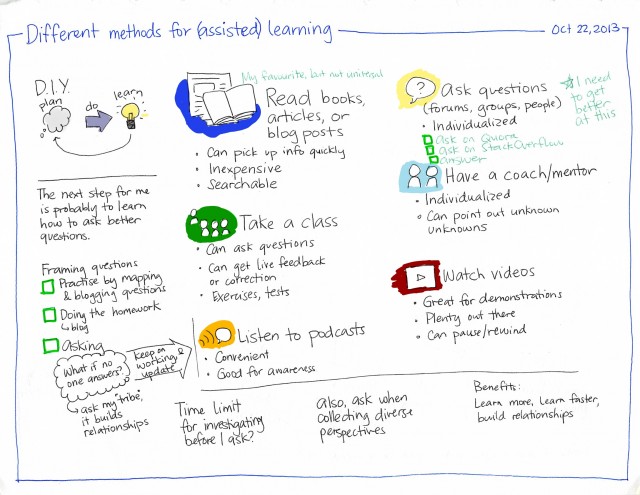
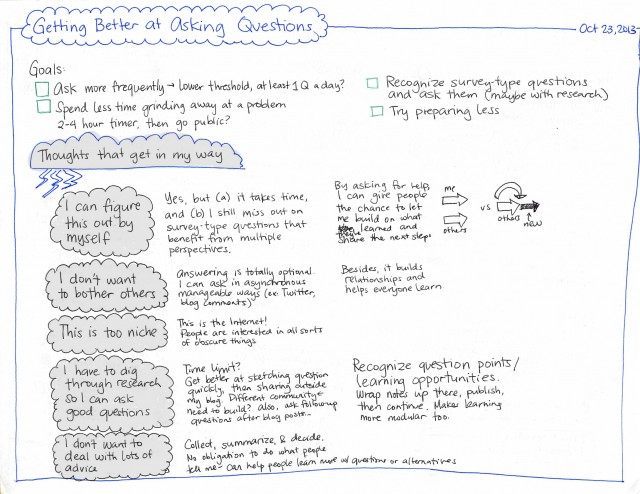
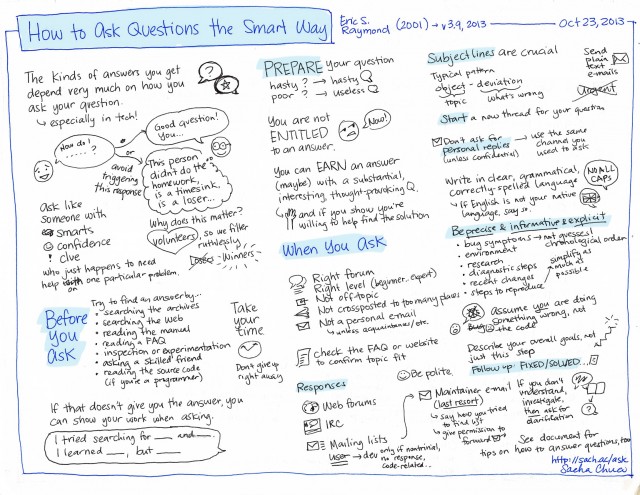
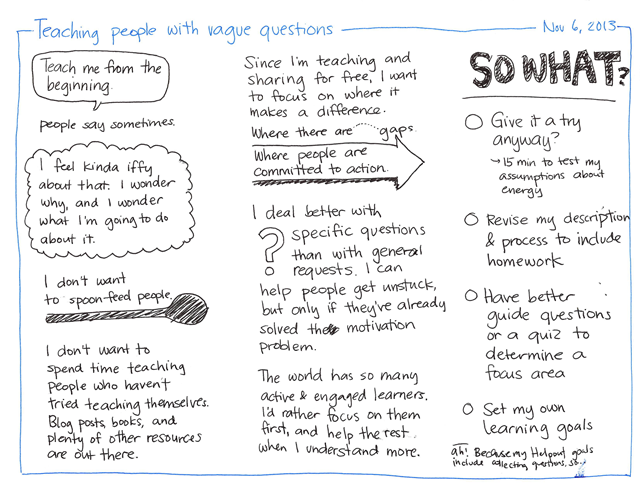
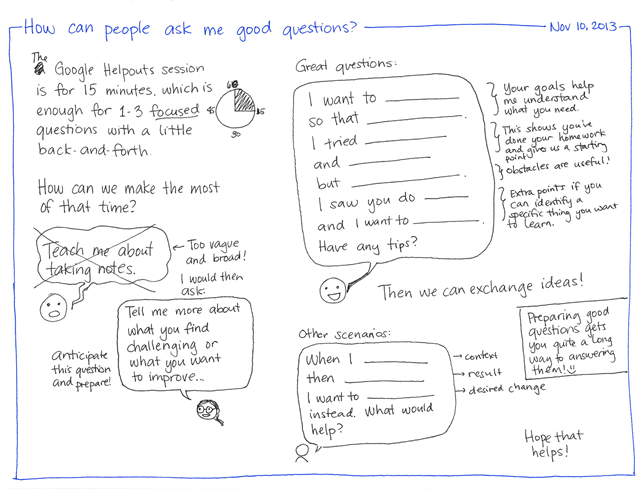
4 comments
Patricia
2013-11-13T15:36:41ZWell! you have added color, my eyes are happy.
Eric E. Vogt, Juanita Brown, and David Isaacs
THE ART OF POWERFUL QUESTIONS: Catalyzing Insight can try at the library.
Open questions on topics that matter to you or the people!
sachac
2013-11-13T18:55:16ZMost of the new ones don't have colour since I've been publishing so many of them and then writing about them afterwards... <laugh> I'll try to add more colour to other ones, though!
sachac
2013-11-13T18:56:33ZThanks for reminding me about that! I came across it in someone else's comment too: http://sachachua.com/blog/2... - good resource.
Laurence Lachapelle-Bégin
2015-02-22T17:41:57ZHi Sacha, I read this post as part of a seminar I'm taking on personal knowledge management (Harold Jarche's "PKM in 40 days"), and it is a great start in my reflection on how to ask better questions. My job as an ICT Education Advisor in a college is all about questions : my own and the ones I answer for teachers and fellow professionals. And like you, I don't want to waste time, other people's or my own. I learned from experience that being precise and giving a context is essential, because it prevents a lot of back and forth in the communication chain. And as you mention in your last drawing, the questions I receive tend to be very vague or broad ("Can you train us on the interactive whiteboard?"). Therefore, in my first reply or in my registration forms, I always ask participants about what tasks they want to achieve with the technology. Although some people remain broad ("I don't know", "everything"...), others can be specific and I focus on those to prepare my "answers" or my training. When it's individuals asking for help, I just keep asking questions from different angles until I get a sense of what they need.
Thank you for sharing your thoughts, and here is a resource shared by Harold Jarche in the seminar that resonates with your own reflection :
http://donaldclarkplanb.blo...